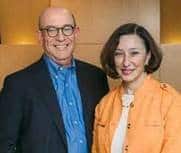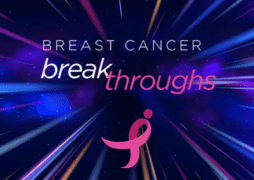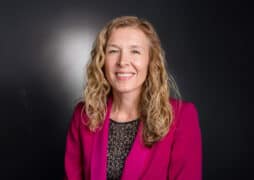Judy Garber, M.D., M.P.H., is receiving a Brinker Award, Susan G. Komen’s highest scientific honor, for all that she has contributed over the past 40 years to breast cancer research and treatment.
She recently spoke with Komen about her interest in preventing breast cancer, her research and the incredible progress we’ve made in treating breast cancer.
Dr. Garber serves as the Susan F. Smith Chair and Chief of the Division of Cancer Genetics and Prevention at the Dana-Farber Cancer Institute in Boston, MA.

Q: The word ‘prevention’ in your position at Dana Farber caught our attention, as we know so many people would be thrilled to hear there’s a pathway to preventing breast cancer. Tell us more about how breast cancer can be prevented.
A: I’d love to prevent breast cancer, too. I think at the moment, however, we may have to settle for delaying breast cancer, which is a good beginning. Unfortunately, the best way to prevent or reduce the risk of breast cancer currently is to have surgery, to remove breast tissue. And that’s not what we want to be doing and not what we want to be offering, especially to our young women.
But there are medications that have been shown to reduce breast cancer risk more broadly for women beyond those with a family history or increased genetic risk. Agents like tamoxifen or raloxifene, are effective at reducing breast cancer risk, but are not ideal because they have side effects people don’t like. There’s also a big trial underway in women with a BRCA1 mutation, an inherited genetic mutation that increases a woman’s risk of developing breast cancer. In this trial, women are given a drug called denosumab, which is used for the treatment of osteoporosis, but it may reduce breast cancer risk in women with a BRCA1 genetic mutation, but only for those with a BRCA1 mutation for the moment.
Q: And what can women do for prevention who may have a mother with breast cancer, but there’s no genetic risk or significant family history?
A: When we talk about prevention – and we have to be very careful because it suggests that one will never going to get the disease and that may not be the case. Most of us are in this category, where breast cancer may have affected a relative but there’s no genetic risk, and I think we can try to optimize lifestyle factors. There’s plenty of data that having a healthy diet – not as much red mean, more vegetables, not so much fat – and exercise may help with lowering risk. We also know that alcohol can increase breast cancer risk.
Q: We’ve come a long way in how we treat and lower breast cancer risk, but we’re still searching for a cure. What are some of the developments you’ve seen that have made a big difference?
A: We shouldn’t say there are not cures because we cure a lot of breast cancer. We just don’t cure all of breast cancer. If we find it early, we have effective treatments. We cure many more breast cancers than we did.
My mother was 43 when she had breast cancer and she had one of those stories where she went to the hospital and came home without a breast. She had chemotherapy, she had radiation. We don’t use the same chemo she had anymore. She had burns and it was a terrible odyssey, but she lived 40 years after her diagnosis.
Her care today would be so different. And I feel like I have been part of and witnessed a transformation in what we can do for women with breast cancer and what we can do to lower risk for breast cancer. It’s hardly the same thing. It’s so different now.
Q: Genetics is a big part of your work. How has our understanding of genetics shaped the way we approach breast cancer, whether it be detection or treatment, especially in high-risk individuals?
A: My own family history of breast cancer is very strong. I’m sure that’s why I became interested in this field. Although we’ve never found a gene mutation in our family, we have found gene mutations for many families, and we’ve learned what the genes do.
For people who are found to have some genetic risk, or even people who are negative for a genetic mutation and feel guilty about it because their relatives still have risks, but they don’t, having support for the emotional pieces of this is important. Everybody worries about their children and their siblings and their relatives. We can help people have access to genetic testing, and help those with genetic risk to have access to more intensive surveillance to increase the chance of early detection. We can help some women undergo risk-reducing surgeries. Many investigators, including prior Brinker Award winners like Mary Claire King, Henry Lynch, David Livingston and Alan Ashworth contributed to understanding of breast cancer genetics, and enabled the exciting progress in treatment with PARP inhibitors, which have been shown to be effective in the management of metastatic disease and recently newly diagnosed breast cancer in BRCA1/2 carriers. But we have much more to do!
Q: The family piece is so important for those with an inherited genetic risk of breast cancer. Do you have any tips for talking to family members and sharing information about genetic risk so that everyone can be informed?
A: I think all of us who work in this area recognize that families are complicated. Often the most we can try to do is help our patients figure out how to make the information available to their relatives. We may give them a letter to send out, so they don’t have to call people they haven’t talked to in 20 years, and say, “I found out this is in the family.”
This is part of care. This is what we do for our cancer patients, it’s what we do for our high-risk patients. Although we don’t want them to feel like they’re cancer patients, we want them to feel like healthy people trying not to get cancer.
*Dr. Garber is also a Professor of Medicine at Harvard Medical School.



